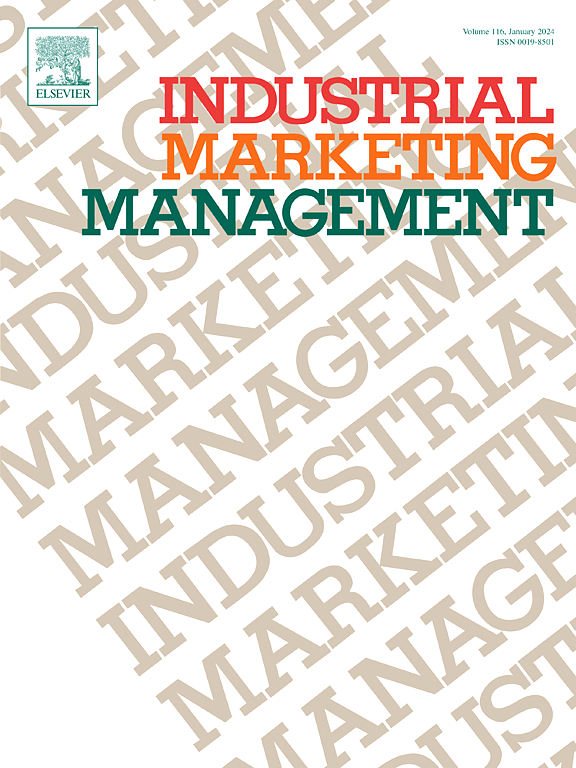Different roads lead to Rome: A configurational investigation of solution Salespeople's sales success in business-to-business markets
IF 7.5
1区 管理学
Q1 BUSINESS
引用次数: 0
Abstract
Business-to-business firms are increasingly pursuing service-oriented business models by offering customer solutions. Whereas prior research highlights the important role of solution salespeople's competencies in successfully selling solutions, it remains largely unclear how solution salespeople achieve sales success through their competencies. Drawing on the job demands–resources model and configuration theory, this article explores whether and how competency configurations impact solution salespeople's sales success. Insights from in-depth interviews with solution sales managers indicate that complex equifinal configurations of competencies qualify individual salespeople to master their lead coordinating role in facilitating solution sales success. The findings from two fuzzy-set qualitative comparative analyses using dyadic data reveal specific equifinal configurations of key personal competencies (i.e., abilities related to salespeople's personalities) and procedural competencies (i.e., abilities related to salespeople's enactment of the solution-selling process) that qualify individual salespeople in their role, thus determining their solution sales success. Accordingly, sales success is facilitated by unique strength profiles such that successful solution salespeople are neither required to possess the full range of personal competencies nor to excel along the solution-selling process.
不同的道路通向罗马:解决方案的配置调查销售人员在企业对企业市场的销售成功
b2b公司越来越多地通过提供客户解决方案来追求面向服务的业务模式。尽管先前的研究强调了解决方案销售人员的能力在成功销售解决方案方面的重要作用,但解决方案销售人员如何通过他们的能力获得销售成功仍然很不清楚。本文利用工作需求-资源模型和配置理论,探讨了胜任力配置是否以及如何影响解决方案销售人员的销售成功。从对解决方案销售经理的深入访谈中得出的见解表明,复杂的能力等效配置使单个销售人员能够掌握他们在促进解决方案销售成功方面的领导协调角色。使用二元数据的两个模糊集定性比较分析的结果揭示了关键个人能力(即与销售人员个性相关的能力)和程序能力(即与销售人员制定解决方案销售过程相关的能力)的特定等效配置,这些能力使销售人员能够胜任其角色,从而决定其解决方案销售的成功。因此,销售的成功是由独特的优势促成的,这样成功的解决方案销售人员既不需要拥有全方位的个人能力,也不需要在解决方案销售过程中脱颖而出。
本文章由计算机程序翻译,如有差异,请以英文原文为准。
求助全文
约1分钟内获得全文
求助全文
来源期刊

Industrial Marketing Management
Multiple-
CiteScore
17.30
自引率
20.40%
发文量
255
期刊介绍:
Industrial Marketing Management delivers theoretical, empirical, and case-based research tailored to the requirements of marketing scholars and practitioners engaged in industrial and business-to-business markets. With an editorial review board comprising prominent international scholars and practitioners, the journal ensures a harmonious blend of theory and practical applications in all articles. Scholars from North America, Europe, Australia/New Zealand, Asia, and various global regions contribute the latest findings to enhance the effectiveness and efficiency of industrial markets. This holistic approach keeps readers informed with the most timely data and contemporary insights essential for informed marketing decisions and strategies in global industrial and business-to-business markets.
 求助内容:
求助内容: 应助结果提醒方式:
应助结果提醒方式:


